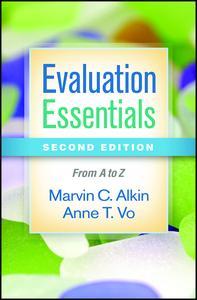Evaluation Essentials, Second Edition (2nd Ed.) From A to Z
Auteurs : Alkin Marvin C., Vo Anne T.

Thoroughly revised and updated, this engaging text has given thousands of students and new evaluators the practical information and expert advice needed to conduct or use evaluations. In 26 concise sections, the book describes how to articulate answerable evaluation questions, collect and analyze data using both quantitative and qualitative methods, and deal with contingencies that might alter the traditional sequence of an evaluation. Special strengths of the text are its attention to individual, organizational, and community culture and emphasis on building collaborative relationships with stakeholders. An in-depth case study and related end-of-section exercises (including group activities) help students put themselves in the evaluator role. Other pedagogical features include section titles written as questions, bulleted recaps of each section, "Thinking Ahead" and "Next Steps" pointers, cautionary notes, and suggestions for further reading.
New to This Edition
*New and expanded topics: evaluation contracts, budgeting, surveys, data visualization, qualitative coding and memoing, factors affecting evaluation use, and context-sensitive evaluation.
*Revised case study with extended exercises that guide the reader to complete a simulated evaluation.
*End-of-section "Quick Read" links to recommended American Evaluation Association blog posts.
*Four entirely new sections (such as "How Do You Strengthen Relationships with Stakeholders?" and "How Do We Plan a Process-Focused Evaluation Design?"), plus other changes and additions throughout.
A. What Is Evaluation?
B. Why do Evaluations?
C. Who Does Evaluations?
D. Contracting for Evaluations
E. Who Are the Stakeholders for an Evaluation?
F. How Do You Strengthen Relationships with Stakeholders?
G. How Do You Describe the Program?
H. What Is the Organizational, Community, and Political Context of the Program?
I. How Do You “Understand” the Program?
J. What Are the Questions/Issues to be Addressed?
K. What Are Instruments for Collecting Quantitative Data?
L. What Are Instruments for Collecting Qualitative Data?
M. How Do Data Collection Issues Impact Potential Evaluability?
N. Are the Questions Evaluable?
O. How Do We Plan a Process-Focused Evaluation Design?
P. How Do We Plan an Outcome-Focused Evaluation?
Q. How Do We Manage the Evaluation?
R. How Are Quantitative Data Analyzed?
S. How Are Qualitative Data Analyzed?
T. How Are Analyzed Data Used to Answer Questions?
U. How Are Evaluation Results Reported?
V. What is the Evaluator’s Role in Helping Evaluations to Be Used?
W. What Are the Evaluation Standards and Codes of Behavior?
X. How Are Costs Analyzed?
Y. What Is the "Theme" of This Book?
Z. How Can You Embark on a Program to Learn More about Evaluation?
Appendix A. Factors Affecting Evaluation Use
Appendix B. An Evaluation Lesson
Appendix C. Use Factors--Relationship to Research Compilations
Marvin C. Alkin, EdD, is Professor Emeritus in the Social Research Methodology Division of the Graduate School of Education and Information Studies at the University of California, Los Angeles (UCLA). He has been a member of the UCLA faculty since 1964, and at various times has served as Chair of the Education Department and Associate Dean of the School. Dr. Alkin is a founder and former Director of the Center for the Study of Evaluation, which was established in 1966 by the U. S. government and which continues to be an integral part of the UCLA Graduate School of Education and Information Studies. A leading authority in the field of evaluation, he is best known for his work on the use of evaluation information in decision making and on comparative evaluation theory. Dr. Alkin is a recipient of the Lazarsfeld Evaluation Theory Award and the Research on Evaluation Award from the American Evaluation Association. He has published more than 150 journal articles, book chapters, books, and technical reports; has consulted to numerous national governments; and has directed over 100 program evaluations in the United States and internationally.
Anne T. Vo, PhD, is Assistant Professor of Clinical Medical Education at the Keck School of Medicine of the University of Southern California (USC). Dr. Vo’s substantive interests as an evaluation scholar-practitioner lie at the intersection of comparative evaluation theory, evaluation capacity building, and organizational development. Her research, publications, and evaluation practice contribute to the field's understanding of how evaluation can be practiced better, where and how social science theory and evaluation science dovetail into each other, and how this knowledge can be leveraged to drive change. Dr. Vo established the Keck Evaluation, Institutional Reporting, and Assessment Office at USC, which aims to support the transformation of medical training through research, service, and education, and currently serves
Date de parution : 12-2017
15.2x22.9 cm
Date de parution : 11-2017
15.2x22.9 cm



